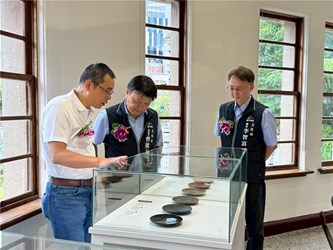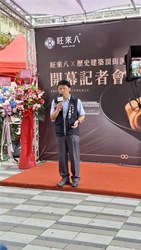
Constructed in 1936, the Dingjie Police Station is a rare example of a two-story police station from the period of Japanese rule. Built with reinforced concrete and brick masonry, the structure features clean, powerful lines characteristic of the Expressionist architectural style, reflecting significant historical value and architectural aesthetics. Through a public bidding process, True Roll Limited Company was awarded the operating rights to the site and introduced its brand “Wang Lai Ba” into the space. The site has since been transformed into a new venue that integrates local pastry culture with craft exhibitions. In addition to offering specialty pastries and cultural gift sets, the venue collaborates with local artisans and cultural groups to organize guided walking tours during festive occasions. Deputy Director Tseng Neng-Ting remarked that cultural heritage sites should not only be restored but also revitalized, so the public can truly engage with and appreciate them.
Shih Hung-Wei, founder of the “Wang Lai Ba” brand, explained that the first floor has been designed as a retail and experiential space, featuring signature Taiwanese souvenirs such as pineapple cakes and tea snacks. The second floor offers daily tea service and complimentary tastings, creating a warm and welcoming atmosphere for guests. Additionally, a traditional lacquerware culture exhibition is on display, showcasing the industrial history of Fengyuan as the “Capital of Lacquer.” Through the exhibition, visitors are invited to gain a deeper appreciation for the rich heritage of lacquerware art.
As a native of Fengyuan, Shih Hung-Wei drew inspiration from his hometown’s former name, “Huludun,” and its rich cultural heritage to design the signature figure-eight-shaped pineapple cake, symbolizing good fortune and prosperity. The brand’s philosophy centers on “sharing blessings and bringing hope,” with the aspiration that each bite of pastry serves as a bridge that connects people.
The Cultural Affairs Bureau noted that this revitalization project blends local characteristics with private-sector creativity, breathing new life into a historic space. By integrating the energy of the private sector with historic spaces, they aim to create an experiential venue where “culture can be tasted and memories can be smelled.” The bureau will continue to promote similar cultural heritage revitalization efforts, ensuring that historic buildings serve not only as landmarks but also as integral parts of everyday life.

 Facebook
Facebook
 Twitter
Twitter
 LINE
LINE

